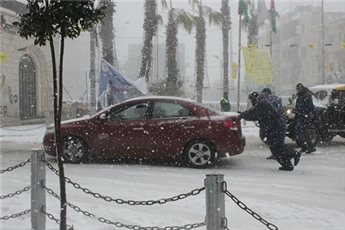
Snow continued falling over night across the Holy Land while rain, hail, and winds continued blowing throughout the day. (Photo: Ma’an News Agency)
Bethlehem, 18 Rabi’ul Awwal 1436/9 January 2015 (MINA) – The streets of towns and villages across the Holy Land were nearly devoid of traffic Thursday as millions took advantage of an official holiday to try their hardest to keep warm at home as Storm Huda pounded Palestine for a second day.
Snow continued falling over night across the region while rain, hail, and winds continued blowing throughout the day, bringing bone-chilling cold to areas that rarely ever experience such drops in temperature.
A light dusting of snow was even reported in the hills of Beit Lahiya in the northern Gaza Strip, only five kilometers from the coast near the border with Israel, while the hill-top West Bank towns of Ramallah, Bethlehem, and Hebron found themselves covered in snow for the second day in a row, Ma’an News Agency quoted by Mi’raj Islamic News Agency (MINA) as reporting.
Pedestrian and vehicular traffic across Palestine remained low as locals avoided unnecessary travel, and with all schools and government offices closed — and the vast majority of private businesses shutting down as well — the streets were unusually calm throughout the day and into the evening.
Also Read: Israel Can Resume Gaza Aggression if Hamas Doesn’t Disarm: US
In Gaza, nearly 110,000 Palestinians left homeless by Israel’s summer assault braved temperatures barely above freezing, with those living in tents buffeted by extremely heavy winds.
Raed Dahshan, the director of civil defense services in the Gaza Strip, told Ma’an that nine people were hurt Thursday morning as parts of buildings housing the dislocated flew off and hit people.
Civil defense teams had to evacuate seven people to the hospital after the roofs of their homes collapsed in the al-Zawayda neighborhood in central Gaza alone.
Two others were evacuated from the Zaytoun neighborhood of Gaza City, meanwhile, after water tanks flew off of a nearby roof and slammed into their home.
Also Read: UN Warns Gaza Humanitarian Situation ‘Extremely Dire’ as Winter Approaches
Despite the injuries, emergency crews in Gaza reported that they were able to carry out their duties as normal, managing to empty a number of flooded streets overnight.
An emergency crew committee told Ma’an that they had drained 10 flooded streets and 30 flooded potholes, averting widespread fears that winter storm Huda would see a repeat of the major flooding and street shut downs lasting weeks Gaza has seen repeatedly in recent years.
A committee crew managed to control a fire that broke out in al-Bastat market in the al-Shujaiyya neighborhood and put it out.
West Bank bunkers down against the cold
Also Read: Israeli Airstrikes Kill 25 Gazans, Injure 77 in Ceasefire Violation
In the West Bank, meanwhile, the second day of the storm brought freezing cold but relatively little precipitation, easing fears of major, sustained road blockages.
Civil defense crews, however, remained vigilant, with snow and rain expected to hit many parts of the region again on Friday in what many meteorologists are predicting will be the final day of the storm.
Head of Bethlehem civil defense Khalifa al-Talhami told Ma’an civil defense crews had learned from last year’s snowstorm and had prepared several vehicles to plow the snow and be on the ready for emergencies.
One of the most notable differences between Storm Huda and Storm Alexa — which brought several feet of snow in Dec. 2013 — was that the power had managed to stay on so far this time around, in marked contrast to that storm.
Also Read: Israeli Occupation Forces Detain Over 200 Palestinians in Beit Ummar Raids
The director of the Jerusalem electricity company responsible for the Bethlehem region, Jawad Abu Zir, said that technicians had been working since the summer on fixing wires and generators which had been damaged in previous storms and ensure they were strong enough to deal with this year’s season.
Abu Zir said he expected no major cuts in electricity services like last year unless something “unexpected” occurs.
In 2013, electricity was cut to parts of the West Bank for as a much as a week, leaving hundreds of thousands of Palestinians in temperatures below freezing with roads closed and supplies running low.
The collapse of electricity infrastructure that year was exacerbated by the slow response of Israeli technicians, who fixed lines serving areas inside Israel and Jewish-only settlements in the West Bank but delayed working on those supplying electricity into the West Bank.
Also Read: Israel Announces Land Seizure of 4,600 Dunums Near Nablus in West Bank
Despite the relatively mild effects of the storm so far, officials in Bethlehem told Ma’an that they were not willing to take any chanced.
Deputy Governor of Bethlehem Mohammad Taha told Ma’an that a joint operations room including civil defense, Palestinian Red Crescent, the ministry of local governance, the ministry of public works, the Jerusalem electricity company, the water authority, and the local councils of Bethlehem had been established to ensure that whatever happened on the last day of the storm, the region would be ready. (T/P010/P3)
Mi’raj Islamic News Agency (MINA)
Also Read: Israel Welcomes UNSC Gaza Resolution, Opposition Criticizes Deal










![Israeli tanks and APC’s gather by the Israeli – Lebanese border. Amid Israel’s escalating campaign against Hezbollah in Lebanon on September 30, 2024. [Erik Marmor/Getty Images]](https://en.minanews.net/wp-content/uploads/2024/10/IMG_20241001_203226-300x197.jpg)





















 Mina Indonesia
Mina Indonesia Mina Arabic
Mina Arabic